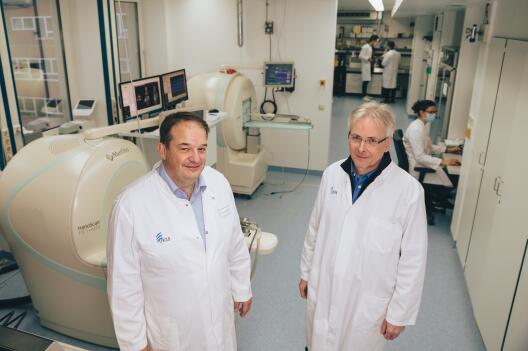Millions in funding for research into imaging inflammation

The Collaborative Research Centre (CRC) 1450 “inSight – Multiscale imaging of organ-specific inflammation” at the University of Münster, which has been running since January 2021, will receive approximately 13 million euros from the German Research Foundation for a second funding period of four years starting in January 2025. In this project, researchers are investigating how the body regulates inflammation in different organs and are, to this end, developing a specific multiscale imaging methodology. The DFG has also announced its support for the CRC 1459 “Intelligent Matter – From responsive to adaptive nanosystems” at the University of Münster for an additional funding period.
CRC 1450 “inSight – Multiscale imaging of organ-specific inflammation”

“Many common diseases are associated with inflammation”, explains Prof Michael Schäfers, a nuclear medicine specialist and the research network’s spokesperson. Inflammation is a reaction of the immune system which, in a healthy body, enables the body to see off pathogens and heal damage. “However, if overshooting immune responses occur – for instance in autoimmune and vascular diseases, traumas and infections – this can permanently affect patients and even become life-threatening,” says Schäfers. In cancers, in contrast, the immune system response is suppressed by the tumour cells, rendering it inefficient.
“We need a holistic view that enables us to analyse inflammatory mechanisms at the cell level and, at the same time, to recognise their impact on the organism as a whole – in other words, when and where dynamics arise that determine the course of the disease,” explains Schäfers. To this end, the scientists are developing a “multiscale imaging” paradigm. This methodology makes it possible to analyse examination data from various imaging technologies in an integrated manner. The techniques used range from microscopy to whole-body imaging and capture various spatial and temporal dimensions of the inflammatory processes. Clinician scientists, biologists, biochemists, chemists, physicists, mathematicians and computer scientists work closely together linking biomedical and methodological questions. Since 2023, many of the scientists involved have been working in a shared infrastructure, the Multiscale Imaging Centre at the University of Münster, where they bring together a wide range of state-of-the-art imaging technologies.

“We will now refine the basic principles that we have developed for multiscale imaging and use them to analyse inflammatory processes in complex disease models,” explains Schäfers. In the long term, the researchers aim to develop new examination options for clinical imaging that may help detect inflammation and assess how effective a therapy is. It is hoped that their investigations may also provide starting points for the development of personalised immunomodulatory therapies.
The project includes the training of junior researchers at the interface between life sciences and natural sciences. In addition to approximately 30 working groups from four faculties at the University of Münster, the team involves partners from the Universities of Bielefeld and Hohenheim and the Max Planck Institute for Polymer Research in Mainz. The project is at the core of the “Cell Dynamics, Inflammation and Imaging” profile area at the University of Münster.
Collaborative Research Centres
Collaborative Research Centres are interdisciplinary research bodies setup to run for up to twelve years with funding from the German Research Foundation. CRCs enable work to be undertaken on innovative, ambitious research projects. Currently, there are eight Collaborative Research Centres based at the University of Münster. Researchers from Münster are also involved in many other multi-university CRCs.

